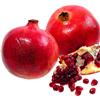 During the American Society of Nephrology Annual Meeting, researchers at Western Galilee Hospital in Nahariya, Israel, reported that patients on hemodialysis who drank moderate amounts of pomegranate juice saw improvement in lipids, blood pressure, and the number of antihypertensive medications required.
During the American Society of Nephrology Annual Meeting, researchers at Western Galilee Hospital in Nahariya, Israel, reported that patients on hemodialysis who drank moderate amounts of pomegranate juice saw improvement in lipids, blood pressure, and the number of antihypertensive medications required.
First, the details.
- 35 hemodialysis patients were randomly assigned to a treatment group for 12 months.
- 100 mL of pomegranate juice 3 times a week
- Equivalent-tasting placebo
- Changes in triglycerides, LDL (bad) cholesterol, high HDL (good) cholesterol, systolic and diastolic blood pressure, and the number of antihypertensive drugs required were recorded.
And, the results.
- Lipid profile improved with pomegranate juice group but not with placebo.
- There were statistically significant decreases in triglycerides, especially in patients with baseline triglycerides of at least 200 mg/dL.
- HDL cholesterol rose significantly.
- These parameters did not change with placebo.
- Systolic blood pressure significantly improved with juice, especially in patients who had a baseline systolic pressure of at least 140 mmHg.
- This was not the case with placebo.
- At 12 months, the juice group was taking significantly fewer antihypertensive drugs than the placebo group.
- Juice: 22% of patients were taking fewer vs 12% taking more antihypertensive drugs.
- Placebo: 8% were taking fewer vs 37% taking more antihypertensive drugs.
The bottom line?
Pomegranate juice contains high levels of potassium. This could be a problem in patients like those studied here. Accordingly, patients with chronic kidney disease and dietary potassium restrictions should be monitored by a healthcare professional.
12/4/11 6:59 JR